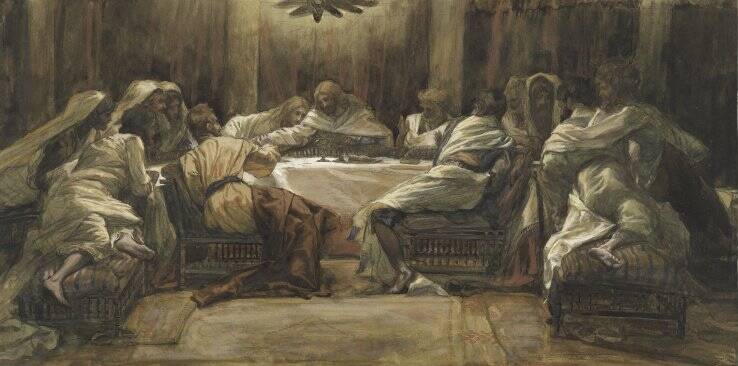A Homily for Holy Thursday
Readings: Exodus 12:1-8, 11-14 1 Corinthians 11:23-26 John 13:1-15
Strange, how lyrics can make their way into our memory not to be dislodged. If they speak to us, they stay with us. Like these lines from Charlie Chaplin’s “Smile”:
Smile, though your heart is aching
Smile, even though it’s breaking
When there are clouds in the sky
you’ll get by
If you smile through your fear and sorrow
Smile and maybe tomorrow
You’ll see the sun come shining through
for you.
Who has not been in some situation that demands a smile even though their heart is breaking?
Was it like that for Jesus, the night before he died? Passover is Israel’s great act of thanksgiving, the night she praises God for her deliverance from slavery. Being sad then is like having a blue Christmas, and the last thing a considerate person would want to do is to bring everyone else down.
In the synoptic Gospels, Jesus celebrates his last Passover with his disciples, while in St. John’s Gospel, he dies on the feast itself. What is beyond question is that Jesus knew his death was nigh. Sift Gospel verses through the most rigorous sieve of historical criticism and that fact remains clear. He had set himself against powerful forces. How could his fate differ from that of John the Baptist? Or from the countless others who have challenged power and suffered the consequences: Martin Luther King, Óscar Romero, Alexei Navalny?
Indeed, we might ask: On the night before he died, was Jesus smiling even though his heart was breaking? Did he preside over a ritual of deep joy because he did not want to disappoint his disciples or burden them with his fears? Would they not have understood or accepted his demurral to preside over the celebration? Did Jesus give thanks for deliverance and the Davidic dynasty even though his heart was aching? Did he praise God for the gifts of the law and the land while that same heart was breaking?
If we credit the circumstances, a Christ concealing the depths of his own heart to his disciples makes complete sense. But that is not what happened. Instead, Jesus laid bare his inner depths.
No account of the meal records him speaking of fear, even though he warns his disciples, “If the world hates you, realize that it hated me first” (Jn 15:18). No, Jesus instead continues to speak, ever so oddly, of glory. On this night, he speaks of its hour having arrived:
Now is the Son of Man glorified,
and God is glorified in him.
If God is glorified in him,
God will also glorify him in himself,
and he will glorify him at once (Jn 13:31-32).
We could comprehend a Christ who smiles though his heart is breaking. Perhaps the joy of this night will lift his spirits?
Light up your face with gladness
Hide every trace of sadness (“Smile”)
But this is a Christ whose shattered yet strong spirit imbues and dominates the night. Instead of giving thanks for the covenant over the first bread broken, Jesus tells his disciples, “This is me, for you.” Later, a cup of joy becomes the chalice of his blood.
His adversaries will charge him with blasphemy. Had they been present at this meal, their point would have been proven beyond all doubt. By what right does a rabbi make himself the center of Israel’s devotion, Israel’s hope? Nowhere is his audacity more evident than his injunction to celebrate all future Passovers “in remembrance of me” (1 Cor 15:24-25).
The heart of Christ is breaking, but he is not dissembling. He is too deeply rooted in the will of his Father, come what may. Indeed, he assures his disciples that they will also be able to face the wrath of the world if they remain like branches of this vine, planted deeply in the heart of the Father (Jn 15:1-17).
The Eucharist is the church’s great act of thanksgiving. As we say each time we gather,
It is truly right and just,
Our duty and our salvation,
Always and everywhere to give you thanks,
Lord, holy Father, almighty and eternal God.
We pray this even though we may not feel particularly grateful, even though we ourselves might be amid pain and sorrow, might be afraid, might see little cause for confidence. And we do not dissemble; we hope.
If we smile though our hearts are aching, we do this in remembrance of him, the one so deeply rooted in his Father’s will. In Christ and at his command, we give thanks because we are convinced that the deepest longings of the heart, even a broken heart, will yet come true.
Light up your face with gladness
Hide every trace of sadness
Although a tear may be ever so near
That’s the time you must keep on trying
Smile what’s the use of crying
You’ll find that life is still worthwhile
If you’ll just
Smile








